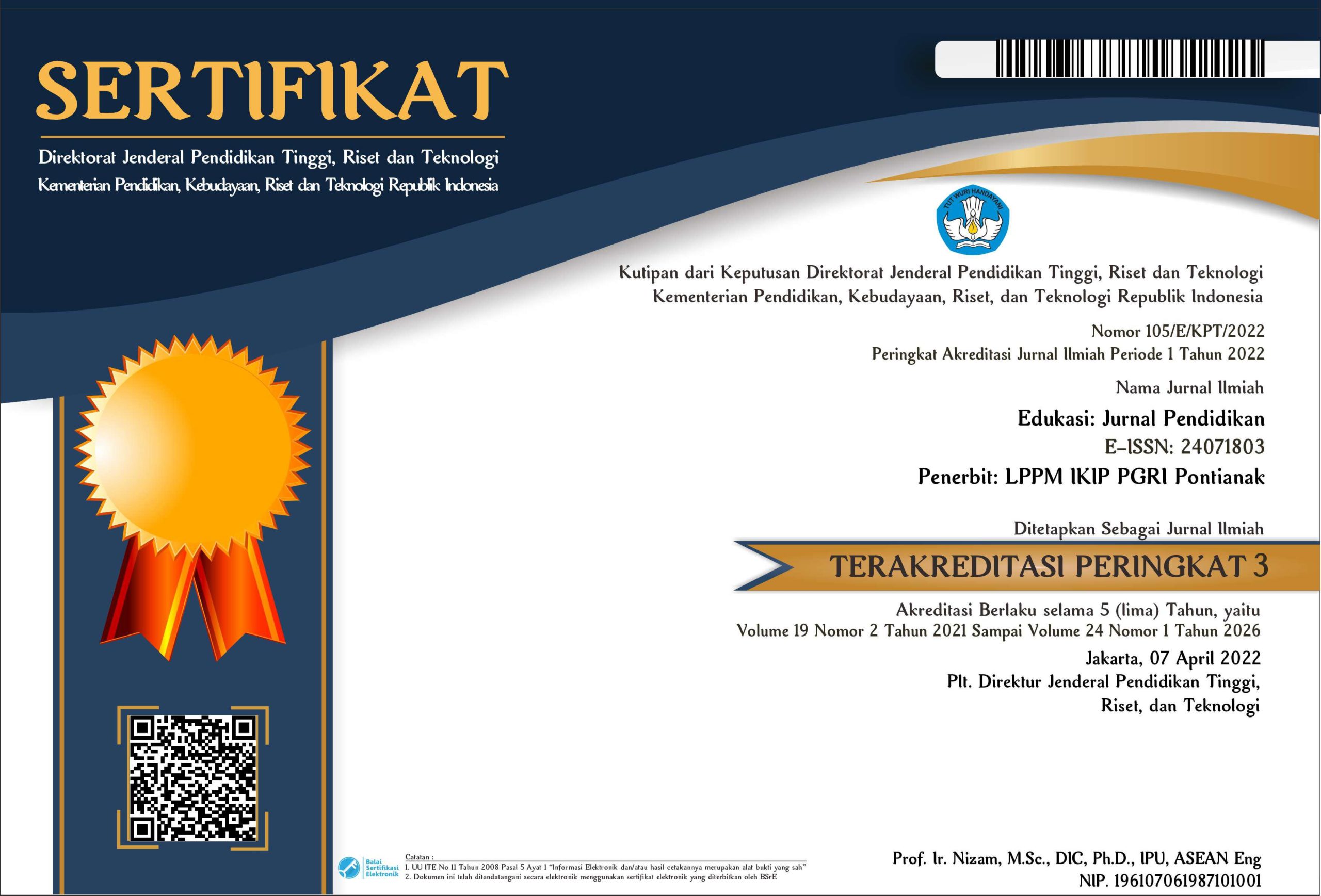PENGUKURAN TINGKAT KEPUASAN MAHASISWA FAKULTAS TEKNIK UNIVERSITAS MUHAMMADIYAH SURAKARTA TERHADAP KUALITAS PEMBELAJARAN DENGAN METODE ZONE OF TOLERANCE
DOI:
https://doi.org/10.31571/edukasi.v22i2.7538Keywords:
kepuasan pelanggan, service quality, Zone of ToleranceAbstract
Mahasiswa Fakultas Teknik Universitas Muhammadiyah Surakarta (FT UMS) di enam prodi mengeluhkan kualitas pembelajaran saat pandemi COVID-19. Penelitian ini bertujuan untuk mengetahui tingkat kepuasan mahasiswa tersebut terhadap kualitas pembelajaran saat itu. Subyek penelitian ini adalah 355 mahasiswa program studi strata 1 aktif FT UMS angkatan 2017-2019 di keenam prodi dan pernah mengalami pembelajaran daring maupun luring setidaknya selama satu semester penuh. Metode yang digunakan pada penelitian ini adalah survei. Data dikumpulkan dengan menyebarkan kuesioner. Pengolahan maupun analisis data dilakukan dengan uji validitas dan reliabilitas, gap servqual, serta Zone of Tolerance (ZOT). Penelitian menemukan bahwa jumlah nilai ZOT pada pembelajaran daring yang berada di bawah nilai Measure of Service Adequacy (MSA) adalah 98, lebih banyak daripada jumlah nilai ZOT pada pembelajaran luring yang berada di bawah nilai MSA yang berjumlah 31. Hal ini menunjukkan bahwa tingkat kepuasan mahasiswa terhadap pembelajaran daring lebih rendah daripada tingkat kepuasan mahasiswa terhadap pembelajaran luring.
Downloads
References
Ada, S., Baysal, Z. N., & Erkan, S. S. Ş. (2017). An Evaluation of Service Quality in Higher Education: Marmara and Niğde Omer Halisdemir Universities’ Department of Education Students. Universal Journal of Educational Research, 5(11), 2056–2065.
Adhikari, G. P. (2021). Calculating the sample size in quantitative studies. Scholars’ Journal, 4(December 2021), 14–29.
Alzafari, K., & Ursin, J. (2019). Implementation of quality assurance standards in European higher education: does context matter? Quality in Higher Education, 25(1), 58–75.
Anugraheni, T. D., Izzah, L., & Hadi, M. S. (2023). Increasing the students’ speaking ability through role-playing with Slovin’s formula sample size. Jurnal Studi Guru Dan Pembelajaran, 6(3), 262–272.
Asiyai, R. I. (2022). Best practices for quality assurance in higher education: implications for educational administration. International Journal of Leadership in Education, 25(5), 843–854.
Baber, H. (2020). Determinants of students’ perceived learning outcome and satisfaction in online learning during the pandemic of COVID19. Journal of Education and E-Learning Research, 7(3), 285–292.
Carvalho, N., Rosa, M. J., & Amaral, A. (2023). Cross-border higher education and quality assurance. Results from a systematic literature review. Journal of Studies in International Education, 27(5), 695–718.
Chen, T., Cong, G., Peng, L., Yin, X., Rong, J., & Yang, J. (2020). Analysis of User Satisfaction with Online Education Platforms in China During the Covid-19 Pandemic. Healthcare (Switzerland), 8(3).
Chu, A., & Westerheijden, D. F. (2018). Between quality and control: what can we learn from higher education quality assurance policy in the Netherlands. Quality in Higher Education, 24(3), 260–270.
Fatonah, S., Kusrini, & Nasiri, A. (2018). Analisis Kualitas Layanan E-Commerce Menggunakan Metode Zone of Tolerance. Jurnal Informasi Interaktif, 3(3), 193–200.
Fry, K. (2001). E-learning markets and providers: Some issues and prospects. Education + Training, 43, 233–239.
Hajjar, S. T. EL. (2018). Statistical analysis: internal-consistency reliability and construct validity. International Journal of Quantitative and Qualitative Research Methods, 6(1), 27–38.
Hart, C. M. D., Berger, D., Jacob, B., Loeb, S., & Hill, M. (2019). Online learning, offline outcomes: online course taking and high school student performance. AERA Open, 5(1), 1–17.
Hutauruk, A., & Sidabutar, R. (2020). Kendala Pembelajaran Daring Selama Masa Pandemi di Kalangan Mahasiswa Pendidikan Matematika: Kajian Kualiatatif Deskriptif. 02(01), 45–51.
Kusumawati, H., & Wawolumaja, R. (2014). Analisis Kualitas Pelayanan dengan Pemetaan Zone Of Tolerance (Studi Kasus: Saung Angklung Udjo). Jurnal Ilmiah Teknik, 3(1).
Lysenko, I., Verbytska, A., Novomlynets, O., Stepenko, S., & Dyvnych, H. (2023). Analysis of online learning issues within the higher education quality assurance frame: ‘pandemic lessons’ to address the hard time challenges. Education Sciences, 13(12), 1193: 2-17.
Moyo, N. (2020). Covid- 19 and the future of practicum in teacher education in Zimbabwe: Rethinking the ‘new normal’ in quality assurance for teacher certification. Journal of Education for Teaching, 46(4), 536–545.
Parasuraman, A., Valerie A, Z., & Berry, L. L. (1985). A Conceptual Model of Service Quality and Its Implications for Future Research. Journal of Marketing, 49(4), 41–50.
Pei, L., & Wu, H. (2019). Does online learning work better than offline learning in undergraduate medical education? A systematic review and meta-analysis. Medical Education Online, 24(1), 1666538: 1-13.
Poo, M. C. P., Lau, Y. Y., & Chen, Q. (2023). Are virtual laboratories and remote laboratories enhancing the quality of sustainability education? Education Sciences, 13(11), 1110: 1-13.
Prasetya, T. A., & Harjanto, C. T. (2020). Pengaruh mutu pembelajaran online dan tingkat kepuasan mahasiswa terhadap hasil belajar saat pandemi Covid19. Jurnal Pendidikan Teknologi Dan Kejuruan, 17(2), 188–197.
Sangadji, E. M., & Sopiah. (2013). Perilaku Konsumen – Pendekatan Praktis. Penerbit ANDI.
Siahaan, M. (2020). Dampak Pandemi Covid-19 Terhadap Dunia Pendidikan. Jurnal Kajian Ilmiah, 1(1), 73–80.
Silitonga, Y., & Eminency. (2012). Analisa Perbandingan Kualitas Belajar - Mengajar Antara Metode Face to Face dan Video Conference. Jurnal Sistem Informasi, 4(2), 477–487.
Singh, P., Sinha, R., Koay, W. L., Teoh, K. B., Nayak, P., Lim, C. H., Kumar Dubey, A., Das, A., Faturrahman, I., & Aryani, D. N. (2021). A comparative study on effectiveness of online and offline learning in higher education. International Journal of Tourism & Hospitality in Asia Pasific (IJTHAP), 4(3), 102–114.
Stukalo, N., & Lytvyn, M. (2021). Towards sustainable development through higher education quality assurance. Education Sciences, 11(11), 1–15.
Susanti, A., Soemitro, R. A. A., Suprayitno, H., & Ratnasari, V. (2019). Searching the appropriate minimum sample size calculation method for commuter train passenger travel behavior survey. Journal of Infrastructure & Facility Asset Management, 1(1), 47–60.
Syarkawi. (2019). Analisis Kepuasan Mahasiswa Terhadap Pelaksanaan Perkuliahan di Prodi Tadris Metematika Fakultas Tarbiyah dan Keguruan Universitas Islam Negeri Sultan Thaha Saifuddin Jambi. In Universitas Islam Sultan Thaha Saifuddin.
Vaske, J. J., Beaman, J., & Sponarski, C. C. (2017). Rethinking internal consistency in Cronbach’s Alpha. Leisure Sciences, 39(2), 163–173.
Wardhani, S. E., Iriani, & Handoyo. (2019). Analisis Kepuasan Pelanggan Jasa Cuci Dengan Metode Servqual, Zone of Tolerance, Dan Importance Performance Analysis Di Vicha Laundry, Surabaya. Journal of Industrial Engineering and Management, 14(2), 13–21.
Yen, S. C., Lo, Y., Lee, A., & Enriquez, J. M. (2018). Learning online, offline, and in-between: comparing student academic outcomes and course satisfaction in face-to-face, online, and blended teaching modalities. Education and Information Technologies, 23(5), 2141–2153.
Yu, H., Wang, S., Li, J., Shi, G., & Yang, J. (2022). Influence of online merging offline method on university students’ active learning through learning satisfaction. Frontiers in Psychology, 13, 842322: 1-13.
Yusny, R., Rizki, F., Trisnawati, I. K., & Mulia, M. (2021). Offline or online?: EFL students’ perceptions on working in face-to-face and virtual learning modes. Englisia: Journal of Language, Education, and Humanities, 9(1), 113–128.
Zhafira, N. H., Ertika, Y., & Chairiyaton. (2020). Persepsi Mahasiswa Terhadap Perkuliahan Daring Sebagai Sarana Pembelajaran Selama Masa Karantina Covid-19. Jurnal Bisnis Dan Kajian Strategi Manajemen, 4, 37–45.
Downloads
Published
How to Cite
Issue
Section
License
Copyright (c) 2024 Naomy Artanti Icha Leksono, Eko Setiawan

This work is licensed under a Creative Commons Attribution-NonCommercial 4.0 International License.
Authors who publish in this journal agree to the following terms:
- Authors retain copyright and grant the journal the right of first publication with the work simultaneously licensed under a Creative Commons Attribution License (CC-BY-NC) that allows others to share the work with an acknowledgment of the work's authorship and initial publication in this journal.
- Authors are able to enter into separate, additional contractual arrangements for the non-exclusive distribution of the journal's published version of the work (e.g., post it to an institutional repository or publish it in a book), with an acknowledgment of its initial publication in this journal.
- Authors are permitted and encouraged to post their work online (e.g., in institutional repositories or on their website) prior to and during the submission process, as it can lead to productive exchanges, as well as earlier and greater citation of published work.















